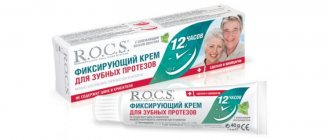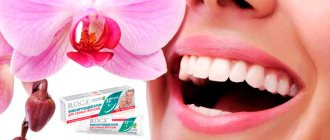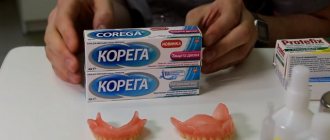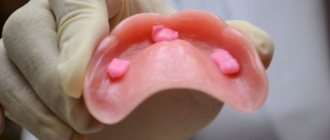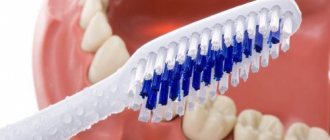One of the main problems that people with removable dentures face is insufficiently secure fixation. Despite careful individual selection, the structure can move while chewing food, talking, or laughing. This occurs due to insufficient adherence of the inner surface of the denture to the gum.
The solution to the problem is the use of special fixing substances. Today, the range of these products is widely represented in the windows of pharmacies and supermarkets. The products are produced in the form of a cream or gel.
Television advertising promises an immediate and long-lasting effect, but the consumer has a lot of questions: what to choose and should you believe the advertising?
Cream for fixing dentures
This is the most popular substance, suitable for all types of removable dental structures. Many customers ask the pharmacy for glue to fix dentures. But if you look at it, cream and glue are the same thing.
Yes, it really allows you to securely fix the removable structure on the surface of the gums. But which brand of denture bonding cream is best on the market?
Criteria for a quality fixing cream
- Duration of action
. The duration of fixation is one of the main characteristics. The instructions for modern creams state that they are able to hold a denture for 12-24 hours. It is more convenient when the fixation agent works all day long. In this case, there is no risk of unexpected detachment of the prosthesis at the most inopportune time. - Safety
. The fixing cream or glue should not contain substances that are toxic or damaging to the mucous membrane. This will ensure safe use of the product over a long period. - Structure
. Manufacturers specially produce fixing agents with different consistencies so that the consumer can choose the product for themselves. The gel is most often liquid, so it is easier to apply, but at the same time its consumption increases. Liquid products are recommended for the first time after dental prosthetics. Cream or glue has a thicker consistency. However, it must be applied in doses to the prosthesis, because an excess of the substance has a negative effect on the fixing properties. - Additional ingredients
. Thanks to the auxiliary components included in the cream, you can not only ensure reliable attachment of the denture, but also freshen your breath and reduce gum inflammation.
Features of various cements for crowns
Table 1. Features of various cements for crowns
| Type of cement | Example | Characteristics | Application |
| Composite cement | High strength and adhesiveness, aesthetics. | Suitable for fixing not only ceramic crowns, but also veneers and lumineers. | |
| Zinc phosphate cement | One of the very first cements used. Easy to use. Has average strength and adhesiveness. May temporarily increase tooth sensitivity (up to 3 weeks). | Suitable for single crowns and small bridges. | |
| Glass ionomer cement | This aluminosilicate glass with a high fluorine content is an excellent caries prevention. High adhesion, but low strength. | It is used for increased risk of caries and high tooth sensitivity. | |
| Polycarboxylate cement | High biocompatibility, serves as additional prevention of caries. However, it has low adhesiveness and strength. | Used for fixing single crowns with high tooth sensitivity. | |
| Modified glass ionomer cement | Innovative material. Combines the advantages of composites and glass ionomers: high strength and adhesiveness. | It is used for installing both single crowns and bridges. Suitable for people with an increased tendency to caries. |
Cream "Korega" for dentures
One of the leaders in the fixing agents market. The line consists of 3 types:
- extra strong mint;
- neutral;
- refreshing.
According to data, it ensures fixation of a removable denture throughout the whole day. It comes with mint or neutral flavor. The cream does not contain zinc, so it can be used on an ongoing basis.
How to apply cream
Fixing cream for dentures "Korega" is applied in strips to the inside of the previously cleaned insert structure. It is also necessary to rinse your mouth to remove any remaining food.
After pressing the prosthesis to the gums, the product should not enter the oral cavity. After attaching the structure, it is not recommended to immediately start eating. For strong fixation, you need to wait 10-15 minutes.
Removing the prosthesis
Corega glue reliably fixes dentures, so it is possible that you will need to remove the structure yourself at the end of the day. It's easy to do:
- First you need to rinse your mouth with warm water.
- Then, using rocking movements, try to remove the denture from the oral cavity.
- If it is still fixed, you need to lightly press on the gum mucosa from the cheeks and remove the denture.
- After removing the denture from the oral cavity, it should be thoroughly rinsed using special products recommended by the manufacturer of the fixing cream.
How to use it correctly
Regardless of consistency, price and manufacturer, most fixing creams are used in an identical way:
- Wash the removable product thoroughly with a soft brush and soapy water, and air dry for a couple of minutes.
- Next we use the cream itself. Almost every instruction shows a visual illustration of where the product needs to be applied.
- Put on the prosthesis in the standard way, carefully pressing it against the mucous membrane for at least one minute.
- Try to eliminate food and even water for half an hour.
- Before removing your orthotic, first rinse your mouth with warm water.
The frequency of use of the cream depends on the duration of fixation. This information can be read on the packaging. Experts do not recommend using this product more than once a day. Otherwise, irritation of the mucous membrane and even allergies may begin.
Cream "Rox" for dentures
Another popular means for fixing dentures is Rox cream. This is a joint development of domestic and European specialists, capable of holding a removable structure for 12 hours even when drinking hot drinks. The mint extracts included in the composition freshen breath for a long time.
Among the features of the cream are:
- No dyes or zinc, which makes it safe for long-term use.
- Suitable for prostheses made of various materials. Rox glue is suitable for fixing dentures made of plastic, nylon and other composites.
- Economical. Due to the dense structure of the cream, consumption is minimal. One tube will last approximately 1.5-2 months.
- Application. Rox cream can be applied to both dry and wet dentures. This does not affect the quality of fixation.
- Availability. You can buy Rox cream for dentures in almost every pharmacy or supermarket.
The production of fixatives for dentures continues to develop, and new, better quality creams appear periodically. It is quite difficult to keep track of this on your own. Therefore, if you want to choose the best cream for fixing dentures, consult your dentist.
What to do if a tooth crown falls out
- First of all, you need to save the fallen structure and try to make an appointment with the dentist as soon as possible. For example, contact our specialists by phone: 220-86-30.
- Remember that the tooth that was under the crown was left without protection, so it must be treated as carefully as possible. It is necessary to chew food on the opposite side, trying to minimize the load on the tooth to avoid fracture.
- If pain occurs, take a pain reliever.
- If it is not possible to see a doctor in the near future, then try to carefully put the structure in place; before doing this, it must be thoroughly rinsed and dried. This will help preserve the prepared tooth until your visit to the dentist.
The next method is temporary!
an orthopedic dentist within three days
- Buy dental cement (sold at the pharmacy).
- Clean the crown thoroughly with toothpaste. Dry it with a sterile piece of cloth.
- Clean the tooth from food debris using a soft-bristled toothbrush.
- Apply cement to the crown, place the crown on the tooth and hold it in place for one minute. Then close both jaws and remain in this position for about two minutes.
- Remove any remaining cement using gauze.
Never try to glue a crown with superglue. The glue is very toxic, and contact with saliva can lead to dire consequences!
Gel for dentures
The range of gels for fixing dentures is quite limited, since they have a number of disadvantages compared to creams:
- Short fixation time. Due to the characteristics of the composition, the gel must be applied more often than cream, which causes some discomfort.
- Food restrictions. When attaching dentures with gel, it is not recommended to consume hot food or drinks.
- Big expense. The liquid consistency of the gel leads to increased consumption.
Gels are mainly used immediately after prosthetics, so that the patient learns to apply the correct amount of substance to the removable structure. When you press the prosthesis to the gum, the excess product will flow out on its own, but the fixation will still take place.
Which denture gel is best? A qualified dentist can answer this question. In any case, when choosing a product from a well-known manufacturer, you can be sure of its good quality.
Cement for dental crowns
Now let's talk about what dental cement is, with which the doctor fixes the crown on the tooth. Few people know, but it comes in different types. The dentist always decides which option is right for you, based on clinical indications.
There are five types of dental cement:
- composites;
- zinc phosphates;
- glass ionomers;
- polycarboxylates;
- polymer modified glass ionomers.
They all have their advantages and disadvantages, so it would be incorrect to say which one is the best.
When choosing a particular type of cement for fixing a crown, the doctor looks at the following indicators.
- Strength is the ability of cement, after hardening, to compress and unclench when teeth are closed during chewing.
- Adhesiveness is the ability of a substance to adhere to tooth tissue.
- Irritability – the likelihood of an allergic reaction.
- How difficult it will be to remove it.
- Aesthetics.
Adverse reactions
The best cream for fixing dentures should not only be effective, but also not give adverse reactions even with long-term use. In case of an overdose of the drug, the following symptoms may occur:
- increased salivation;
- nausea, possible vomiting;
- general malaise;
- allergic reactions.
If you notice such manifestations, immediately visit your dentist: he will help you choose a remedy that will not cause unwanted reactions.
Criterias of choice
It's hard to say which cream is the best. If you are prone to allergic reactions, we recommend choosing transparent gels without fragrances or dyes. Creams and gels are almost identical in effect, but the first option has a thicker consistency. Let's look at some more useful tips:
- Choose a large-volume tube, it is much more profitable.
- Give preference to products with long-lasting fixation.
- Read the ingredients, do not take creams with a lot of chemical components.
- The price is not so important, but the manufacturer is worth paying attention to. You should not buy little-known products of questionable quality.
If you are in doubt and cannot make a choice, contact a specialist. Depending on the wishes and characteristics of the body, the dentist will advise the best option.
Choosing a fixing agent for dentures
An important problem that people face after removable prosthetics is high-quality fixation of the prosthesis. There are many different fixing agents of varying quality. It is worth knowing how to make the right choice among this variety.
Quality criteria for fixatives Creams and gels can be used for fixation. The first option is more popular. You need to understand that the concepts of “glue” and “cream” are one and the same.
How to choose the right fixing adhesive: 1. Period of action. A high-quality cream should hold for a long time so that there is no psychological discomfort that its effect is about to cease. The optimal period is 12-24 hours. It is most convenient when the cream fixes for the whole day. In this case, there will be no situation where you urgently need to replace the glue at the wrong time. 2. Security. This is a very important criterion, because some products can cause irritation and allergies. The cream must be hypoallergenic and free of toxic substances so as not to irritate the mucous membranes. 3. Additional components. Some beneficial supplements, for example, help freshen breath or prevent inflammation. 4. Structure. Products with different consistencies are specially made so that everyone can choose the most optimal option. Liquid creams are recommended for use during the period of getting used to dentures. Thicker products need to be applied pointwise and carefully, because excess will have a bad effect on the quality of fixation.
Popular representatives:
- Corega cream is known to everyone thanks to widespread advertising. And this is truly a quality product. The line includes several options for creams - refreshing, extra-strong mint and neutral. Corega provides high-quality hold throughout the day. It can be used daily. Corega is applied in strips to the structure itself. After fixing, you need to rinse your mouth well to get rid of any residue. The prosthesis should be pressed well and waited for about 10 minutes without loading it. Then you can eat and talk in peace. It holds very well, so you may have to take it out yourself at the end of the day. First you need to rinse your mouth with warm water, then gently try to remove it with rocking movements. After this, you need to rinse the denture itself and your mouth thoroughly.
- Rox is another popular representative of fixing agents. Its features include: — Availability. You can buy it in almost every pharmacy; — Suitable for structures made of a wide variety of materials; — It can be applied to a wet or dry prosthesis; — There is no zinc or dyes in the composition, which makes this product safe; - Economical consumption - one tube is enough for about 1.5 months.
Features of fixing gels Gels have many disadvantages (relative to creams): - Short fixation - you will have to apply the gel several times a day; — While wearing a prosthesis, it is not recommended to eat or drink hot foods; — Liquid consistency requires increased consumption.
Gels are usually used immediately after prosthetics, when the patient learns to fix the prosthesis correctly. What side symptoms may there be? A high-quality cream should not cause adverse reactions, but in case of an overdose, unpleasant symptoms may appear. To avoid them, you must strictly follow the instructions.
Possible side effects: • Hypersalivation; • Allergies; • Vomiting; • Malaise.
If unpleasant symptoms appear, you need to go to the dentist. The doctor will assess the condition and be able to recommend the most optimal means for fixation.
Sign up for prosthetics and consultation at Cosmodent!


